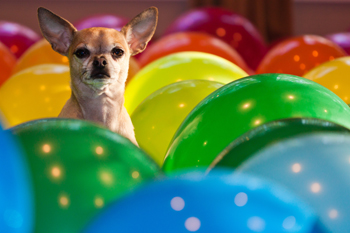
Life isn't an exact science so we often need to estimate things. The concept of a percentage error gives a way of assessing how good an estimate is.
To illustrate the idea, imagine you want to weigh something. You have some old scales in your bathroom, but you know they can be off by up to 1kg. Should you go and buy new scales, or is the estimate provided by the old ones good enough?
The answer is that it depends. If you're weighing an elephant of 4000kg, then the scales' estimate is only off by a tiny percentage of the elephant's true weight, so it's probably good enough. But if you're weighing a chihuahua of 2kg, then a discrepancy of 1kg is off by 50%, which is totally unacceptable.
The discrepancy between the true weight of your animal and its weight as estimated by your scales is known as the absolute error of the estimate. The percentage that this absolute error constitutes of the true weight of the animal is known as the percentage error. As we have just seen, it's the percentage error that is important when it comes to assessing how good the estimate is.
Here's how to work out the percentage error of an estimate in general. Suppose you have an estimate of some quantity and that you also know (or have a good idea of) the true value of the quantity. Write $v$ for the true value and $e$ for the estimated value. The absolute error of your estimation is $$|e-v|$$ The vertical bars indicate that you're taking the absolute value of the difference $e-v$: if the difference is negative, you ignore the minus sign. The absolute error constitutes a proportion of $$\frac{|e-v|}{|v|}$$ of the true value $v$ of the quantity. This translates into a percentage of $$\frac{|e-v|}{|v|}\times 100.$$ And that's the percentage error of your estimate. So for our faulty scales the absolute error is $|e-v|=1.$ For an elephant this gives a tiny percentage error of $$\frac{1}{4000}\times 100=0.025\%.$$ As we've seen, for the chihuahua the percentage error is $$\frac{1}{2}\times 100=50\%.$$
